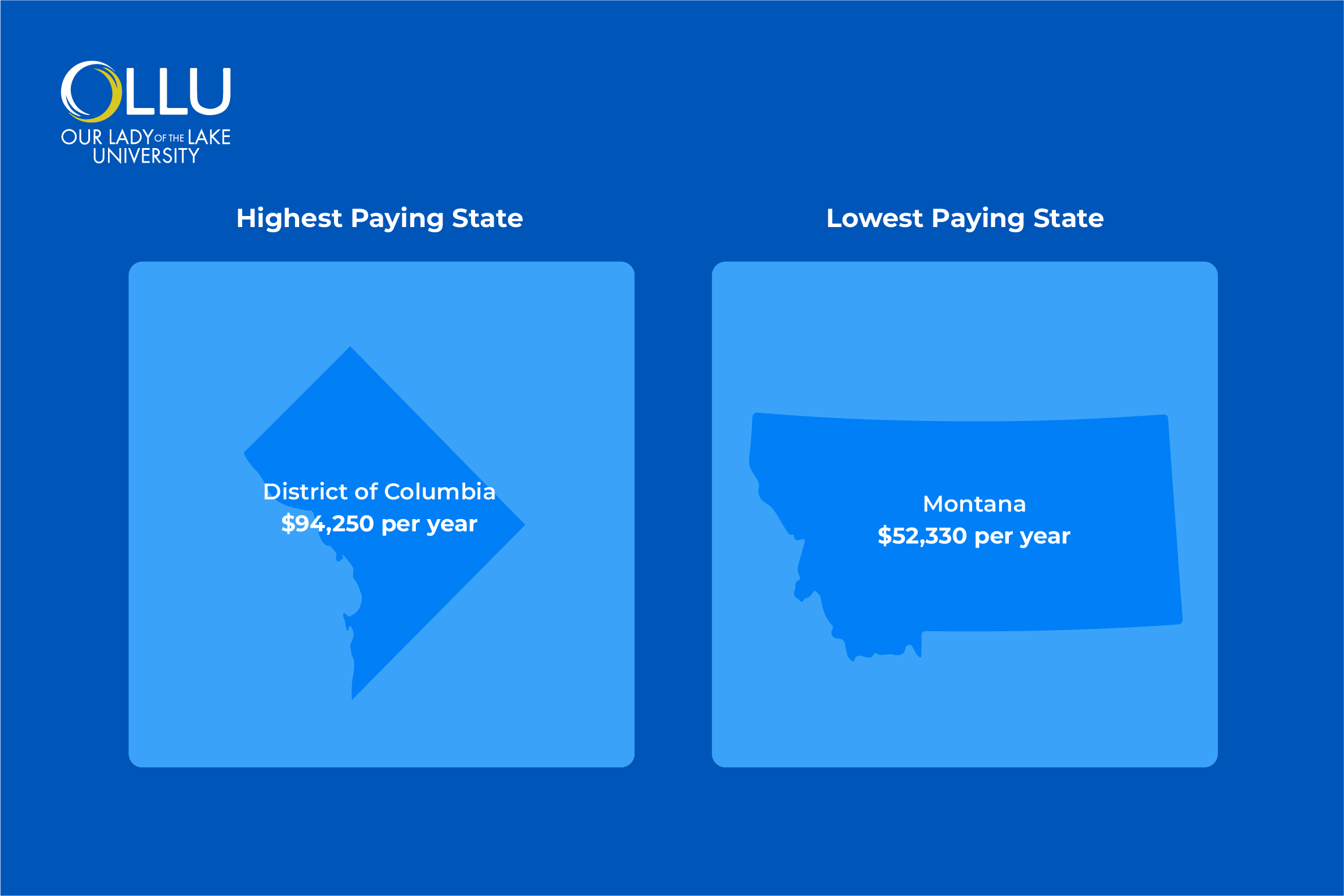How Much Do Social Workers Make? Salary Insights
Jan 20, 2025

Key Takeaways
- The average salary for social workers in the U.S. is approximately $58,380 per year, but it can vary based on education, experience, location, and specialization.
- The top highest-paying states and areas for social workers in the U.S. are the District of Columbia ($94,250/year), Washington ($90,580/year), and New York ($81,550/year).
- To increase earnings as a social worker, you can pursue advanced education, earn certifications and licenses, specialize in high-demand fields, and seek leadership or administrative roles.
Social work is a dynamic and impactful profession dedicated to improving lives and communities. Whether helping individuals overcome personal challenges, advocating for social justice, or addressing systemic issues, social workers are of vital importance.
But how much do social workers make? Read on to find out and discover why this profession is both rewarding and essential!
Average Salary of Social Workers
The average salary for social workers in the U.S. is approximately $58,380 per year, according to the Bureau of Labor Statistics (BLS). However, salaries can range widely, from around $42,464 at the lower end to $79,119 for top earners.
These variations depend on factors such as education, specialization, geographic location, and the work setting. For instance, clinical social workers often earn more than those in community or family services, and salaries tend to be higher in certain states.
Over the past couple of years, social workers have benefited from an increase in their annual salaries. In 2015, for example, social workers earned a standard average annual salary of $49,366, which then increased to $57,098 in 2020, now being $58,380.
Regardless of income, however, each social worker—whether in healthcare, clinical settings, or schools—plays a pivotal role in helping communities cope with their daily challenges and promote healthier living.
Social Worker Salaries by Specialization

Social workers can specialize in various fields based on their education, training,
and interests. These specializations impact the type of work they do and how much
they earn. Below are some common social work specializations, along with their average
annual salaries:
- Clinical social workers: Focusing on mental health, therapy, and counseling, these professionals earn an average salary of $83,046 per year.
- School social workers: They help students with academic, social, and emotional challenges, earning an annual average wage of $80,963.
- Healthcare social workers: These professionals assist patients in navigating medical systems and coping with health challenges. Their average annual salary is $73,397.
- Child and family social workers: Supporting children and families facing abuse, neglect, or other crises; they earn approximately $84,282 per year.
These figures can vary based on location, experience, and workplace (e.g., government, private practice, or non-profit). Additionally, specialized training or advanced degrees, like a Master's in Social Work (MSW), often lead to higher salaries.
Salary for Social Workers by Experience
The salary of a social worker typically increases with experience, expertise, and added responsibilities. Here's how earning potential evolves at different career stages:
- Entry-level social workers: These professionals, often with a bachelor's degree, are just starting their careers. With 1-3 years of experience, they may earn an average salary of $61,992 per year, depending on their location, specialization, and work setting.
- Mid-career social workers: After 7–9 years of experience, many social workers develop specialized skills or obtain advanced credentials, such as a master's degree in social work. Salaries for mid-career professionals are up to $67,116 per year, with higher pay for those in healthcare, clinical, or managerial roles.
- Experienced or senior social workers: With over 15 years of experience or in advanced roles such as clinical directors or administrators, salaries can rise to $77,822 per year or more. Advanced certifications, supervisory duties, and leadership roles significantly boost earning potential.
Again, these figures can vary based on geographic location, specialization, and employer type. However, exploring social worker degree types will surely help increase your chances of getting a higher salary.
Social Worker Pay by Location

Influenced by factors like cost of living and demand for services, location plays
a crucial role in determining the salary of a social worker. Average salaries vary
widely between states, as shown by recent data from the BLS:
The top highest-paying states and areas for social workers in the U.S. are:
On the other hand, the following states fall on the lower end in terms of salary offered:
These figures highlight that urbanized, wealthier states tend to offer higher pay, while rural or less affluent areas may pay less despite comparable job responsibilities. Social workers seeking higher salaries may consider the option of relocating to states with greater demand and funding.
Other Factors Influencing Social Worker Salaries
Social worker salaries also depend on personal qualifications, job characteristics, and external factors. Advanced degrees, like an MSW or a PhD in the field, can lead to higher-paying roles, such as leadership positions, clinical practice, or teaching.
For example, professionals with advanced degrees often qualify for senior or specialized roles, and their salaries can range from $66,000 to $118,000, again depending on experience and location.
Certifications and licenses, such as the licensed clinical social worker (LCSW) credential, significantly influence earning potential. LCSWs (who provide therapy and advanced clinical services) earn $88,903 annually, which is comparatively higher than a clinical social worker's salary without this certification ($63,870).
How to Increase Your Earnings as a Social Worker
As the salary of a social worker can vary depending on numerous factors, there are several strategies to help boost earnings. In order to increase your salary, you can:
Pursue advanced education
Obtaining an MSW can qualify you for higher-paying roles in clinical or administrative positions. Plus, this degree is often a minimum requirement for roles in therapy or advanced practice.
A PhD, on the other hand, can open doors to academic or leadership roles, often offering salaries in the upper range. Advanced education also provides networking opportunities and a deeper understanding of policy and practice, setting you apart in competitive job markets.
Earn certifications and licenses
Certifications demonstrate a commitment to professional development and can open doors to roles in specialized fields or high-demand settings, further boosting income and career stability. Specialized certifications, like school social work or trauma-focused care, tend to increase marketability.
In the same way, obtaining a license and becoming a licensed clinical social worker (LCSW) enhances credibility and earning potential.
Specialize in high-demand fields
BLS reports a 10% estimated growth in employment for healthcare social workers and 12% for those
in mental health and substance abuse. As these areas are in high demand, specializing
in one of those will increase your chances of employability and higher salary.
Additionally, child, family, and school social workers, with a job outlook of 5%, provide another in-demand area one can consider.
Seek leadership or administrative roles
Moving into supervisory or managerial positions in large organizations can result in significant pay increases, especially in healthcare or non-profit management. Leadership roles allow you to influence policy, oversee programs, and manage teams, expanding your career scope.
Additionally, being promoted to administrative positions like program directors or executive roles, not only offer financial rewards but also provide opportunities to make a broader impact within the social work sector.
The Bottom Line
Social work offers diverse career opportunities, with salaries influenced by education, specialization, experience, and location. Advanced degrees like an MSW, licensure, certifications, and roles in high-demand fields like healthcare and mental health significantly boost earning potential.
If you're passionate about helping others and making a lasting impact, social work provides both fulfillment and growth. Take the first step with our Bachelor of Social Work (BSW) program, accredited by the Council for Social Work Education (CSWE). It prepares you for general practice as a social worker, and upon graduation, you become eligible for licensure and a full member of the National Association of Social Workers. It's a rewarding career worth considering!
Frequently Asked Questions (FAQs)
Do social workers get paid overtime or bonuses?
Social workers are typically exempt from overtime pay under U.S. labor laws, but some may receive bonuses depending on their employer or work setting.
What benefits do social workers typically receive in addition to salary?
Common benefits include health insurance, retirement plans, and paid time off.